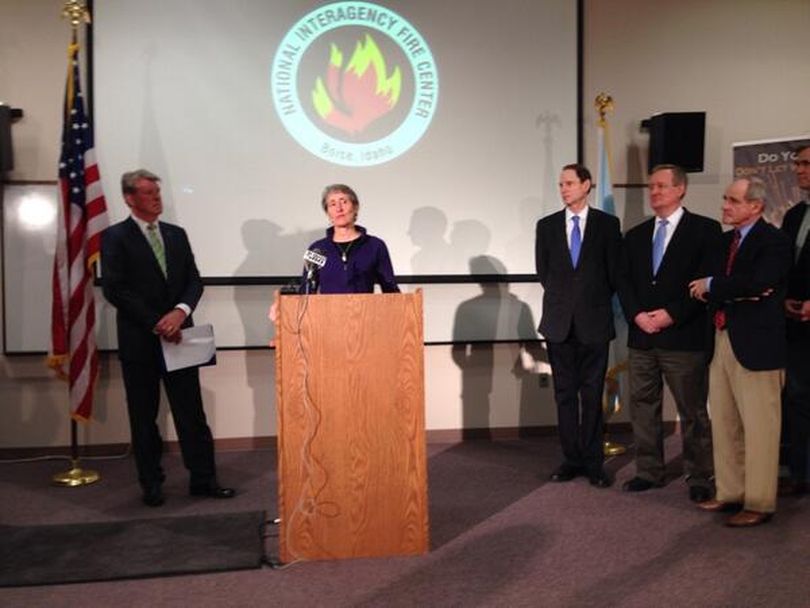New approach to funding firefighting efforts touted

Idaho’s congressional delegation joined two Oregon senators, Interior Secretary Sally Jewell and Idaho Gov. Butch Otter for a Boise news conference today to tout proposed changes in how the nation funds firefighting costs, which would shift the worst wildfires into the same fund that now covers hurricanes, tornadoes, earthquakes and other natural disasters. “Unfortunately, we find ourselves once again preparing for another extreme fire season,” Otter said. “We haven’t had the … money necessary to come forward with the kind of prevention and management that’s necessary.”
That’s because federal agencies for years have faced firefighting costs that far exceed budgets, and have had to dip into prevention and remediation funds, Jewell said, creating even worse fire seasons. “It spirals down and we have to borrow more money and so on,” she said; she's shown speaking here in this Aaron Kunz photo.
“2013 was not a terrible fire year,” the interior secretary said at Boise’s National Interagency Fire Center. “It was sort of a new-normal fire year in some ways. But it exceeded the fire-protection budget … by about a half a billion dollars.”
Under legislation co-sponsored by Sens. Mike Crapo and Jim Risch of Idaho and Ron Wyden and Jeff Merkley of Oregon, the most-destructive wildfires each year – the top 1 percent, which tend to cost about 30 percent of total expenses – would shift into the FEMA fund, instead of forcing the draining of fire-prevention funds. Companion legislation in the House is co-sponsored by Idaho Reps. Mike Simpson and Raul Labrador, among others, and President Barack Obama’s 2015 budget proposal includes the plan.
Crapo, co-author of the legislation, said, “Wildfires have become disasters.” He said they should be treated as such. Added Wyden, “The reason this is so important is that fires now are often bigger, they’re often hotter, and they often last longer. We now feel, on a bipartisan basis, it’s time for a fresh approach with regard to fighting wildfire.”
The idea is not to spend any more money, the officials said – it’s just to plan ahead of time for the disastrous nature of wildfire. “The big fires break out, the bureaucracy ‘borrows’ from the prevention fund in order to fight the fires, and then of course the problem gets worse,” Wyden said. “The problem has been … the prevention fund often doesn’t get paid back.”
The shift in approach, he said, “we think … is going to end up producing savings for the long term,” by allowing fire-prevention efforts to go forward without the current funding fits and starts. “The reality is that we always pay for the fires anyway,” Wyden said.
Jewell said under the new approach – the legislation is now making its way through Congress – federal agencies will fight fires by using their normal budget until they hit 70 percent of the 10-year average. Then, they’d dip into the FEMA emergency funds, which now are capped at $2.6 billion. No increase in the cap is proposed. “It’s fully expected that we can work well within that cap on the disaster plan.” She said NFIC puts out “basically 97 to 98 percent of all fires before they go anywhere. … Then you’ve got this 1 percent that become really extreme. It’s just those we’re talking about taking off the regular suppression budget.”
